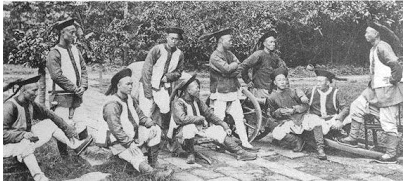
This article attempts to understand Karl Marx’s position on the Taiping Rebellion- by itself, and within his larger evolving discourse of the Asiatic mode of production and the Orient. Marx understands the Taiping Rebellion solely in the capacity of a peasant rebellion, as demonstrated in his article, Revolution in China and Europe. He is supportive of the Rebellion only to express his disapproval of it in his 1862 article, Chinese Affairs. A fairly drastic shift in his opinions occurs in the decade or so between the writing of the two articles, and scholars such as Aijaz Ahmed have attempted to understand the same through the paradigmatic angle of him writing within the capacity of a series of newspaper articles (with the New York Daily Tribune, etc.). This article attempts to shift away from this mode of analysis, in order to delve deeper within the reasons for Marx’s shift in opinions- including changing circumstances within the British occupation in China, the sources from which he received his information, broadly including British envoys to China and missionary correspondence, as well as his own cultural circumstances in writing from London during this period of British involvement in China amidst the Opium wars. A certain picture of the Orient, the Oriental body and the Oriental body in juxtaposition to the European body is borne amid these political circumstances, within the space of London- such as The Great Exhibition of 1851, as well as exhibitions such as Ten Thousand Chinese Things of 1844, in addition to the several opium dens surrounding and within London at the time, and cultural works such as Confessions of an English Opium Eater by Thomas De Quincey, among several other discussed factors. I utilize, in these examples, the further concept of Chinoiserie first suggested by Anne Veronica Witchard in arriving at my formulation of how Marx came to his opinions on the Taiping Rebellion, within the larger discourse of his theories on the Asiatic mode of production, and Oriental despotism. I also compare Marx’s work to the cultural presence of another author who wrote of the Taiping Rebellion at the time, Augustus Lindley, who has a vastly different opinion of the Taiping Rebellion and the British occupation than Marx.
© 2019 ICS All rights reserved.
Powered by Matrix Nodes